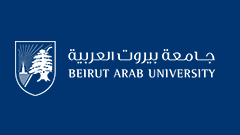English Title
MEDICAL EDUCATION DURING COVID-19 PANDEMIC: THE EXPERIENCE OF FACULTY OF MEDICINE, BEIRUT ARAB UNIVERSITY (BAU): CHALLENGES, SUCCESSES AND LESSONS LEARNED
Keywords
Medical education, Undergraduate students, COVID-19, Virtual learning, online learning
Disciplines
Medical Education | Medicine and Health Sciences
Abstract
Background: The novel Coronavirus pandemic (COVID-19) has significantly disrupted and challenged medical education at the undergraduate and postgraduate levels. In this article, the experience at Beirut Arab University Faculty of Medicine (BAUFM), during the COVID-19 pandemic, is being shared with its challenges, successes and lessons learned. The program of BAUFM is divided into three phases: Pre-Clerkship (Semesters 1 to 6), Clerkship (Semesters 7 to 10), and Pre-internship (Semesters 11 and 12), it extends over six years duration, followed by one year of Internship. The curriculum is developed to be outcomes-based, and is composed from Phases and Modules. Methodology: In this study, Data was collected from interviews with members of Medical Education Department and Quality Assurance Unit, in addition to feedback questionnaire from students and instructors. Qualitative data was summarized, coded and sorted manually, while quantitative data was analyzed using Statistical Package of Social Science (IBM SPSS version 23.1). Results: Adherence to social distancing has eliminated all face-to-face activities, including in-person classes, in-person small group discussions and workshops, during which students used to interact with their peers and tutors in students-centered learning activities. Lectures were covered through help of virtual teaching platforms, online educational resources and audio-recorded Power-Points Presentations; whereby they were given to students in interactive (synchronous) sessions, or provided with audio support (asynchronous). Students’ satisfaction to online learning was 40%. While 54% of instructors believe that online learning should encompass less than 25% of the curriculum, 36% believe that it should cover 25-50%. Reflection and Discussion: The most important challenges that were faced, during the COVID-19 pandemic, were with the clinical rotations that used to take place during the Clerkship and Pre-internship phases. Decision was taken to ensure that all year six clinical rotations were to be completed which enabled their graduation on time. For the 4th and 5th year students, clinical rotations were resumed in Modules that included outpatient clinical exposure, while postponed for other Modules to the next academic year. A number of students (30%), regardless of their level of training, showed interest in community engagement and in volunteering community activities during the Coronavirus pandemic. Lessons Learned: BAUFM, while committed to its mission in graduating competent, humane, ethical, and socially accountable physicians, has to modify its learning strategy to comply with the recent international changes in medical education. Conclusion: Although COVID-19 pandemic has affected the educational program, BAUFM responded early by shifting to online education in the theoretical part of the curriculum. Meanwhile, the educational program and the curriculum learning objectives were maintained to comply with the accreditation standards. The impact of COVID-19 pandemic accelerated the transformation of education in BAUFM to the online and blended learning.
Recommended Citation
Mashaal, Naglaa and Ahmadieh, Hala
(2021)
"MEDICAL EDUCATION DURING COVID-19 PANDEMIC: THE EXPERIENCE OF FACULTY OF MEDICINE, BEIRUT ARAB UNIVERSITY (BAU): CHALLENGES, SUCCESSES AND LESSONS LEARNED,"
BAU Journal - Health and Wellbeing: Vol. 3:
Iss.
3, Article 1.
DOI: https://doi.org/10.54729/2789-8288.1136

